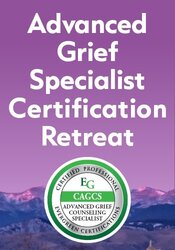

Watch renowned grief educator and Director of Social Work at St. Jude Children’s Research Hospital, Dr. Erica Sirrine, for three days of advanced clinical training and deep personal renewal.
You’ll explore the most effective grief counseling strategies—rooted in cutting-edge research and practical application—for clients navigating loss of all kinds. From developmental considerations to cultural contexts, complicated grief, and meaning-making, you’ll finish with the tools to support even your most complex cases.
You’ll walk away knowing how to:
As a bonus, you’ll receive your Certified Advanced Grief Counseling Specialist (CAGCS) designation—free with registration (a $99 value).*
CERTIFICATION MADE SIMPLE
Attendees will receive documentation of CAGCS designation from Evergreen Certifications 4 to 6 weeks following completion.
*Professional standards apply. Visit www.evergreencertifications.com/cagcs for professional requirements.
Continuing education credit information is coming soon for this non-interactive self-study package.
CE hours may be available for select professions, as listed in the target audience. Hours will be dependent on the actual recording time. Please check with your state licensing board or organization for specific requirements.
There may be an additional fee for CE certificates. Please contact our Customer Service at 1-800-844-8260 for more details.
**Materials that are included in this course may include interventions and modalities that are beyond the authorized practice of your profession. As a licensed professional, you are responsible for reviewing the scope of practice, including activities that are defined in law as beyond the boundaries of practice in accordance with and in compliance with your professions standards.

Dr. Erica Sirrine is a licensed clinical social worker with over 22 years of experience in the field of death, dying, and bereavement. She earned a PhD in social work and has been awarded the distinction of Fellow in Thanatology by the Association for Death Education and Counseling. Dr. Sirrine has conducted and published research on grief and bereavement, including a study on college student experiences of loss amid the COVID-19 pandemic that was published in OMEGA: Journal of Death and Dying and featured in TIME magazine. She maintains a blog on grief and is the author of Sammy’s Story, an anticipatory grief counseling book for young children experiencing the serious illness of a parent.
Dr. Sirrine has extensive expertise providing individual and group therapy to children, adolescents, adults, and families experiencing illness and loss. She has implemented numerous interventions and programs aimed at improving the emotional health of clients and currently serves as the director of social work at St. Jude Children’s Research Hospital. Dr. Sirrine frequently presents seminars on bereavement and loss throughout the United States and is known for her interactive and engaging workshops.
Speaker Disclosures:
Financial: Erica Sirrine has employment relationships with St. Jude Children's Research Hospital. She receives royalties as a published author and a speaking honorarium and recording royalties from PESI, Inc. She has no relevant financial relationships with ineligible organizations.
Non-financial: Erica Sirrine is a member of the Association for Death Education and Counseling, the Association of Pediatric Oncology Social Workers, the National Alliance for Children’s Grief, and the National Association of Social Workers.
Access never expires for this product.
Visit our FAQ page at www.pesi.com/faq or contact us at www.pesi.com/info
Satisfaction Guarantee
Your satisfaction is our goal and our guarantee. Concerns should be addressed to: PO Box 1000, Eau Claire, WI 54702-1000 or call 1-800-844-8260.
ADA Needs
We would be happy to accommodate your ADA needs; please call our Customer Service Department for more information at 1-800-844-8260.
PESI Mobile App
Access CE trainings on your phone or tablet through our free mobile app. Choose video or audio-only versions of online courses from the world’s best instructors, and complete your CE requirements anywhere, anytime, at your own pace.
Please wait ...